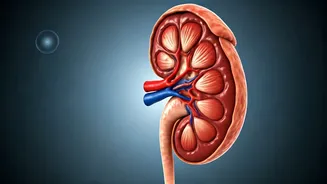Kidney Failure: Overview
Kidney failure is a serious condition where the kidneys lose their ability to filter waste and excess fluids from the blood. Several factors contribute
to this condition. The kidneys, vital organs, perform several crucial functions: filtering blood, regulating blood pressure, and producing hormones that control red blood cell production. When kidneys fail, waste products build up in the body, leading to various health complications. Recognizing the signs and understanding the causes are essential for early detection and management. Early intervention can significantly improve outcomes and prevent the condition from worsening. Regular check-ups and a healthy lifestyle play a key role in maintaining kidney health and preventing kidney failure.
Common Causes Identified
Several factors commonly lead to kidney failure. High blood pressure, if uncontrolled, can damage the blood vessels in the kidneys, hindering their function. Diabetes, another significant risk factor, can cause diabetic nephropathy, a condition that damages the kidney's filtering units. Glomerulonephritis, an inflammation of the kidney's filters, can also cause kidney failure. Polycystic kidney disease, a genetic disorder causing cysts in the kidneys, damages kidney function over time. Prolonged use of certain medications, such as nonsteroidal anti-inflammatory drugs (NSAIDs), can also negatively affect kidney health. Other factors include infections and blockages in the urinary tract. Recognizing and managing these conditions is critical in preventing kidney damage and failure.
Recognizing Risk Factors
Certain risk factors increase the likelihood of developing kidney failure. Individuals with a family history of kidney disease are at higher risk. Age is another factor, as kidney function naturally declines with age. People of African, Hispanic, or Native American descent face a greater risk. Uncontrolled diabetes and high blood pressure significantly elevate the chances of kidney damage. Regular consumption of certain medications, especially NSAIDs, is another risk factor. Obesity and cardiovascular disease also contribute to kidney problems. Understanding these risk factors enables individuals to take proactive steps, such as regular health check-ups and lifestyle modifications, to protect their kidney health.
Early Warning Signs
Early detection of kidney problems can significantly improve treatment outcomes. Common warning signs include changes in urination, such as increased or decreased frequency, or the presence of blood or foam in the urine. Swelling in the ankles, feet, or face can also indicate kidney issues. Fatigue, weakness, and difficulty concentrating are also common symptoms. Loss of appetite, nausea, and vomiting can be signs of kidney failure. Itchiness, dry skin, and muscle cramps may also occur. Any persistent symptoms necessitate immediate medical attention. Regular health check-ups, including kidney function tests, can help detect problems early and allow for timely intervention.
Health Risks & Safety
Kidney failure poses several health risks if left untreated. It can lead to the buildup of toxins in the body, causing various complications. Cardiovascular diseases, such as heart failure, are common complications. Anemia, a reduction in red blood cells, frequently occurs. Electrolyte imbalances can lead to irregular heart rhythms and other problems. Bone diseases can develop due to impaired vitamin D activation. To ensure safety, maintaining a healthy lifestyle is essential. Staying well-hydrated, particularly, helps support kidney function. Managing blood pressure and blood sugar levels is important for individuals with diabetes or hypertension. Regular medical check-ups and avoiding excessive medication use are also critical. Promptly addressing any symptoms and seeking professional help can prevent severe consequences.














